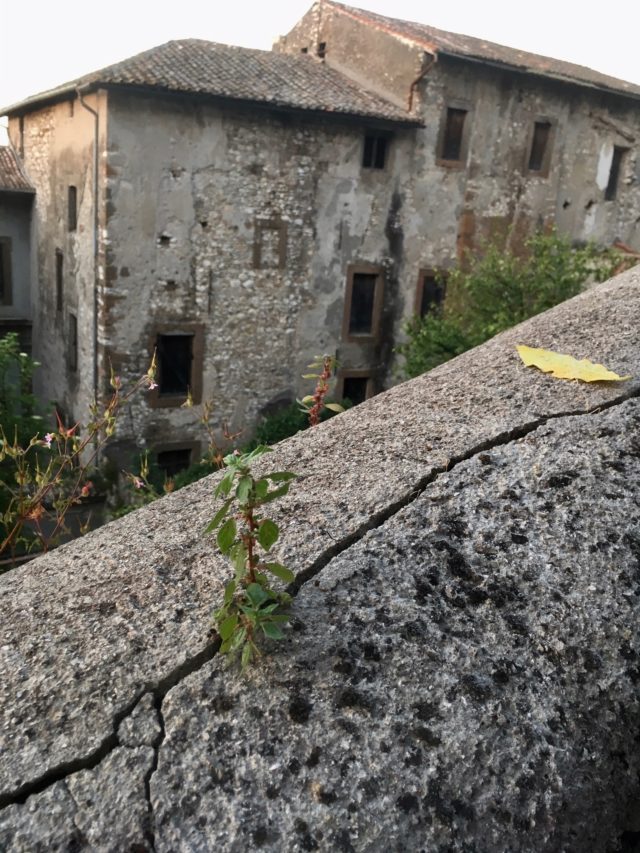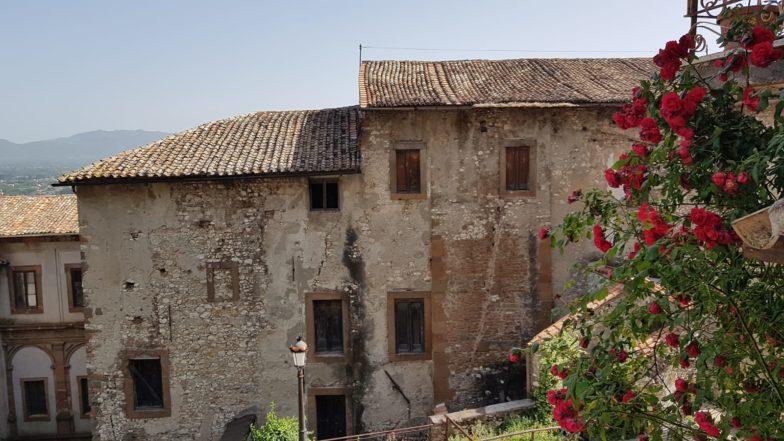
by Sergio Los
Originally published June 15, 2019 on Biourbanistica
Many Italians are desperate. They leave Italy, thinking that it sucks. They do not want to have children in this country. Although they are born here, they come to hate it. This contributes to a difficult demographic crisis, abandoning it to a rather worrying extent (quantity x speed)—one person flees Italy every five minutes! They look for and do not find in Italy what they find in other European or non-European countries. This happens more in the south than in the north where the difference between Italy and the modern world seems smaller, and in part is. Italy has been united militarily, but not culturally, since its unification. Yet it has been more divided than ever since then, so much so that we still believe we can address the issues of the south with the carabinieri. The Christian moral project had united Italy for centuries before the barbaric invasion that led to national unity. Without that moral project, it is difficult to understand any other that could have replaced it. It is certainly very right to help families raise children, but I believe that Italians’ sense of belonging raises the much more radical question of an anti-Italian ideology.
Our country has a long civic tradition aimed at building social capital. It had ruled Europe (first a Roman and then a Christian Europe) for a thousand years with its morality, its language, and its ideas. So many are those years that we can say Europe emerged from Italian culture or has an Italian cultural origin. But then, Europe has changed. This change has a crucial passage in the Reformation, which initiates Modernity. Somehow, such a new emerging culture had to distinguish itself from the previous one and became anti-Italian.
A first transition had already caused the Christian moral project to clash with the Jewish conception about the right to subjugate other communities. The Jews believed that the Messiah had come to vanquish the Roman invaders. Instead, Jesus accepted to endure the cross and affirmed that we must also love our enemies, defending neither the Jews nor the Romans (Render unto Caesar the things which are Caesar’s, and unto God the things that are God’s). He proposes an inter-community moral project aimed at overcoming competitiveness between different communities. The Reformation presents a second transition that collides with techno-scientific modernity. This entitles the individual, single-person communities to subject the universal communities inclusive of everyone, and thus the whole of creation: inanimate, plant, and animal—a creation that the atheistic human intelligence must be free to dominate. Through love, the inter-somatic Christian moral project aims to overcome the competitiveness between all living creatures both human and non-human, thus continuing the inherited creation.
There is too much civic tradition in Italian culture for it to be modern. The Reformation is instead mirrored in the Hobbesian moral project of the homo homini lupus that makes him regress to the intra-communitarian situation that precedes the first transition. It interprets the modern motto bellum omnium contra omnes which, again in Latin, explains the current European “ordoliberalism” against Italy.
Evolutionism also shows a struggle between individuals to survive in an environment with scarce resources. The pedagogical nature of economic inequalities is made clear by the other matrix of Anglo-Saxon capitalism, i.e., the Calvinist reversal of the evangelical verse: ‘it is easier for a camel to go through the eye of a needle than for a poor man to enter the kingdom of God’. The civic proximity that one breathes in Siena, the frescoes of the common good as good government, or the text of the Camollia door, are light years away from the cynicism evoked by modern Western liberalism, to whose violence even the planet is unable to resist.
Italy does not succeed in being modern, but at the same time it does not find the strength and the words to demonstrate to Europe that this modernity is profoundly wrong and that it would have been better for Europe not to stray too far from the civic and moral project of solidarity and settlement that Christian culture had developed in Mediterranean Europe. Not even the rebellion against industrial capitalism took root in the reformed countries. Against Marx’s beliefs, it was instead accepted by the Mediterranean, Italian, Spanish, Greek, and Russian Christian cultures, even when they lacked industries.
The desperation of Italian migrants, which is not even true desperation, raises the following, dramatic issue: shall we Italians accelerate our further industrial revolution and become its accomplices according to the EU will? Shall we become even more modern and completely and definitively abandon our civic, monumental, cultural tradition, and landscape (understood as literature) for us to finally become Anglo-Saxon nomads? Or shall we rather deepen our tradition and make it clear that the mistake lies precisely in the modernity of Anglo-Saxon parasitic capitalism?
I believe in this second perspective because climatic emergency supports it. This testifies to the total incompatibility of industrial colonial liberalism to the survival of the natural environment. If we want to save the planet, I see great potential in the life form of solidarity versus the modern competitive lifestyle. It must be shown that that lifestyle—characterized by the failure of its controlling ‘prescriptive norms’ based on a morality of mutually extraneous individuals—will destroy the environment and even itself. I have been working for years on this project for a form of life alternative to the industrial, megalopolitan lifestyle, but this needs to become a major political project. If not, it will fail.
The climatic emergencies, the destruction of biodiversity, etc., precisely show how groundless and arrogant is the secularization stemmed from the Reformation with its unrealistic, evolutionarily-regressive, and technological nomadism. That modernity that Italians seek abroad is practically over because it is impossible. Its colonial nature makes so that it can go on only by consuming the present and future resources of others. It is a disastrous illusion that needs to be exposed, and it must end as soon as possible. However, we need to develop an alternative project, and we have already accumulated many experiences in this regard. This is a task that should appeal to young Italians. It is a life project to be revived after understanding that our earth, cynically endangered by modernity, is the only form of life for us in the universe, and it rejects mechanization. The political (civic) defense of the Italian civilization coincides (should coincide) with the defense of the only form of life existing in the universe against the delusional disasters produced by thermo-industrial, mechanistic, entropic, physical, and antibiotic societies.
The city is fundamentally organic: it is a superorganism. Therefore, it cannot have a megalopolitan scale, democracy does not accept it. There is no mention of modernity’s physicomechanical invasiveness due to an ideological prohibition, a kind of taboo that comes from the ideological pressure of the industrial world. This pressure has been monstrous throughout the last centuries—obsessive propaganda permeating and pestering any reflection. It is necessary to furiously abandon the mechanization/physicalization that is affecting first the body and then (through computer technology) the mind. Such a process corresponds to moving away from the living realm towards a kind of god-made machine instead of the made-man god. The mechanization of techno-sciences has involved even the very knowledge, so much so that nowadays we are able to “know” only through mechanical prostheses. This has caused a physicalization of life and its estrangement from biology (see the Galilean division between primary and secondary qualities).
To many, this Italy does not promise any future. It does not allow for participating in survival projects nor for connecting its extraordinary existing cities with the mechanized present. No one knows how to relate them to the current values. They see Italy at odds with world values. The future, destiny, and the project of Italy is not about continually coping with the terminal values of the industrial world—values that are devastating the planet and that are incompatible with Italy in the same way as they are incompatible with the planet. Defending Italy is, therefore, defending the planet. They are the same thing, but it is necessary to be thoroughly clear: we need to reject the whole thermo-industrial worldview and the vague ‘military scent‘ that has characterized it since its birth. The malaise of Italy is the malaise of the planet.
The real political death, for which I would flee myself, is this confusion and duplicity running through the idea that the evil and the good, and everything and everyone, can get their act together, and that one can do anything and its opposite without expecting an explosion.
This text is a commentary inspired by the video ‘Il Laboratorio per la distruzione dell’Italia’ by Barbara Pavarotti. This subject will be discussed during the fourth Biourbanism Summer School (Artena, Italy July 13–20, 2019) where Professor Los will lead an intensive workshop open to the participation of professionals and citizens with the goal of designing a viable and necessary model of a civic and “out-of-market” city. The theoretical premises of such a project are displayed in the bilingual volume Città e Paesaggi come Sistemi Simbolici/Cities and Landscapes as Symbolic Systems, Artena, 2019, which can be ordered by writing the publisher: artenarchist@gmail.com
